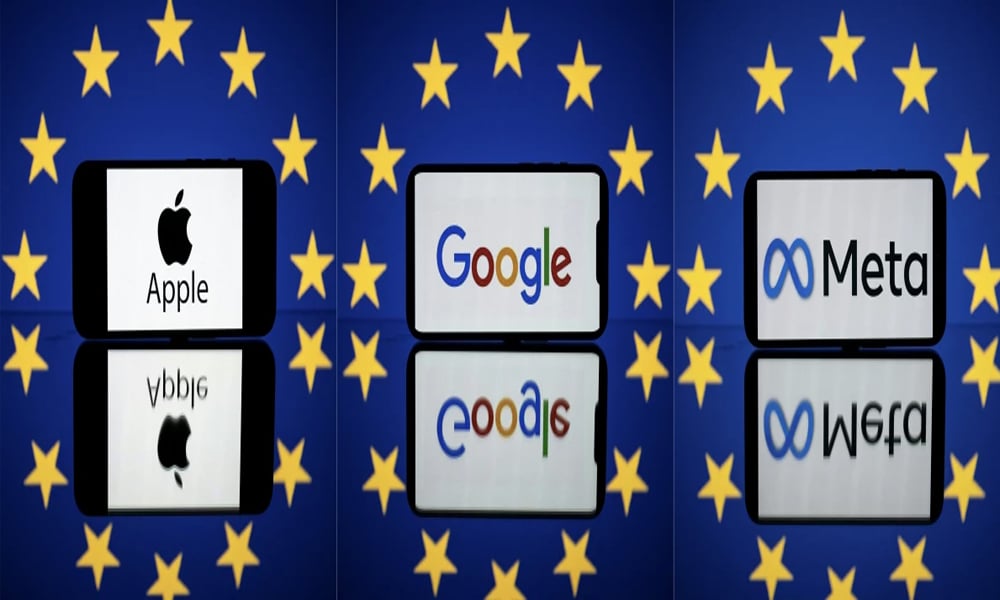BRUSSELS: On Monday, the European Union initiated its first-ever investigations under an extensive digital regulation, targeting tech giants Apple, Google’s parent company Alphabet, and Meta. This move may result in significant penalties for the US-based corporations if found violating the new law.

Six companies, including Amazon, TikTok owner ByteDance, and Microsoft, have been designated as “gatekeepers” in the European Union’s groundbreaking Digital Markets Act. These firms are required to adhere to the new legislation since its implementation on March 7.
“The EU’s internal market commissioner, Thierry Breton, expressed his doubts about whether Alphabet, Apple, and Meta’s solutions uphold their responsibilities in creating a more equitable and accessible digital environment for European citizens and enterprises.”
In a declaration concerning the investigations, the European Commission, which oversees antitrust matters within the European Union, expressed their belief that the current measures implemented by the companies might not be sufficient for achieving full compliance.
Investigations could lead to big fines against US giants
A significant technology lobbying organization, CCIA, comprising the three major companies under scrutiny as its members, criticized the investigations, claiming that the European Union was overly hasty and acted prematurely. In response, the EU’s competition commissioner, Margrethe Vestager, firmly denied any rush in initiating the probes.
High-ranking individuals admit that transformations are currently underway; however, they believe these changes are insufficient. In accordance with the updated guidelines, the regulatory body has the authority to levy fines equal to 10% of a company’s entire worldwide revenue. For recurring offenders, this penalty may escalate to a maximum of 20%.
In exceptional situations, the European Union has the authority to dissolve corporations. Unlike conventional procedures where investigations could span years, the Digital Markets Act (DMA) mandates regulators to conclude their examination within 12 months from its commencement.
Restriction fears
On Monday, investigations are centered around determining if Google Play from Alphabet and Apple’s App Store permit app developers to present consumers with complimentary offers outside their respective marketplaces. The regulatory body expresses concern that the implemented measures might not fully adhere to guidelines, as they involve “multiple constraints and limitations.”
Google faces scrutiny regarding the possibility of its search results preferring the company’s own services, such as Google Shopping or Google Flights, over competitors. In 2017, the European Union imposed a significant fine of 2.4 billion euros ($2.6 billion) on Google due to accusations of self-favoritism.
Google’s competition director, Oliver Bethell, announced that Google has implemented “substantial modifications” to its European operations. He further stated, “We will persist in defending our approach in the forthcoming months.” Meanwhile, Apple expressed its assurance that its strategy aligns with the Digital Markets Act.
Concerns over consent
Apple is being scrutinized regarding the ease of uninstalling apps on its iOS system and the design of its browser choice interface. According to the DMA, gatekeepers are required to present choice screens for web browsers and search engines, ensuring users have diverse options. Additionally, Meta encounters issues with its ad-free subscription model, which has faced criticism from three complaints since its launch in November.
European users are given the option to pay for privacy protection against tracking in advertising, but authorities remain skeptical. According to Breton, “We have serious doubts that this consent is truly voluntary when faced with a limited choice.” Meta, a company that has encountered numerous legal issues in the EU concerning data processing, including a 1.2 billion-euro fine last year for privacy violations, continues to face scrutiny.
Meta explained its Subscription for No Ads initiative, stating, “We developed this service to meet multiple regulatory requirements, including the DMA.” Meanwhile, EU authorities plan to investigate if Amazon is preferencing its own brand products on the Amazon Store and whether Apple’s revised fee structure for alternative app stores could potentially contradict their DMA responsibilities.
An Amazon representative stated that it adheres to the DMA. On Monday, Apple encountered another issue, as it currently faces numerous legal disputes across the Atlantic.
Last week, the US Department of Justice filed a lawsuit against Apple, alleging it maintains a monopoly in the smartphone market. This legal battle occurred shortly after the European Union imposed a 1.8-billion-euro fine on the tech giant for hindering users from accessing affordable music streaming subscriptions. Apple has announced its intention to challenge the EU’s fine.


